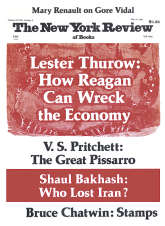To the Editors:
On June 13, 1980, Dr. Walter Rodney, a historian of international prominence and a leader of one of the opposition parties in Guyana, the Working People’s Alliance (WPA), was killed when a bomb exploded and wrecked the car in which he was riding in Georgetown, Guyana. The Associated Press report on the incident stressed the fact that Rodney was the third senior member of the WPA to have been killed in seven months, the others having been killed by the police.
The killing took place while Rodney and others were on trial for a variety of political charges, which centered on charges of arson. Independent observers at the trial have asserted that the proceedings were clearly going against the government of Prime Minister Forbes Burnham and the trial had been suspended for a two-month period in order to give the government opportunity to “improve” its case. At the same time the government had indicted seventeen people associated with the WPA on a charge of treason. All of this occurred after Prime Minister Burnham had personally vetoed the appointment of Dr. Rodney to a position at the University of Guyana. A representative of Amnesty International present in the court during the preliminary examination on these charges declared that Amnesty International will formally adopt the case as a subject of its inquiry into political repression in Guyana.
Dr. Rodney had held academic positions at the University of the West Indies in Jamaica, at the University of Michigan, at the University of Dar-es-Salaam, and at the State University of New York at Binghamton. He was the author of a number of outstanding works on African history, including How Europe Underdeveloped Africa, which probed the impact of the slave trade and colonialism and imperialism upon African development. His Groundings with My Brothers, written versions of popular talks on African and contemporary West Indian politics, penetrated deeply into the struggles of the West Indian people. The first volume of Dr. Rodney’s history of the Guyana labor movement, finished shortly before his death, will be published in 1981 by The Johns Hopkins University Press, with an introduction by George Lamming.
The circumstances of Dr. Rodney’s death and his preeminence as a scholar and political activist who united scholarship and politics and who had gained the respect of serious intellectuals throughout the world and of thousands of working people in Africa, England, America, and the West Indies, demand that an International Commission of Enquiry into the death of Walter Rodney be created.
Those having ideas as to the composition of such a commission and who wish to contribute funds for this effort may write to the Los Angeles Committee for Academics in Peril (LACAP), P.O. Box 25722, Los Angeles, California 90025, which is helping to coordinate information and activities concerning Dr. Rodney’s murder.
Huw Beynon, The University of Durham, England; Lionel Cliffe, University of Leeds, England; Michael Craton, University of Waterloo, Canada; David William Cohen, Johns Hopkins University; Philip D. Curtin, Johns Hopkins University; Basil Davidson, England; David Brion Davis, Yale University; DeWitt S. Dykes, Oakland University; Jack P. Greene, Johns Hopkins University; Herbert H. Gutman, City University of New York; Robert Hill, University of California, Los Angeles; Thomas Hodgkin, England; Chandra Jayawardena, Macquarie University, Australia; Mary Karasch, Oakland University; Vincent B. Khapoya, Oakland University; Franklin Knight, Johns Hopkins University; Robin Mackenzie, Macquarie University, Australia; Anthony P. Maingot, Florida International University; Sidney W. Mintz, Johns Hopkins University; Bertel Ollman, New York University; Richard Price, Johns Hopkins University; George P. Rawick, University of Missouri; Patricia Romero, Johns Hopkins University; Richard Small, Kingston, Jamaica; Immanuel Wallerstein, State University of New York at Binghamton.
This Issue
May 14, 1981



